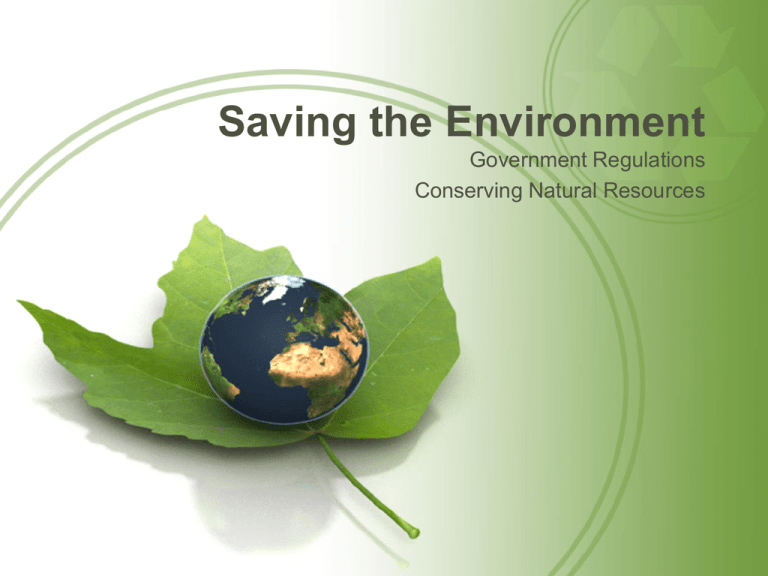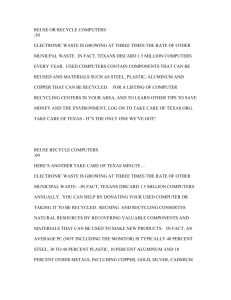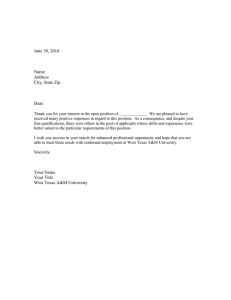
Saving the Environment
Government Regulations
Conserving Natural Resources
Copyright
Copyright © Texas Education Agency, 2014. These Materials are copyrighted © and trademarked ™ as
the property of the Texas Education Agency (TEA) and may not be reproduced without the express written
permission of TEA, except under the following conditions:
1) Texas public school districts, charter schools, and Education Service Centers may reproduce and use
copies of the Materials and Related Materials for the districts’ and schools’ educational use without
obtaining permission from TEA.
2) Residents of the state of Texas may reproduce and use copies of the Materials and Related Materials
for individual personal use only, without obtaining written permission of TEA.
3) Any portion reproduced must be reproduced in its entirety and remain unedited, unaltered and
unchanged in any way.
4) No monetary charge can be made for the reproduced materials or any document containing them;
however, a reasonable charge to cover only the cost of reproduction and distribution may be charged.
Private entities or persons located in Texas that are not Texas public school districts, Texas Education
Service Centers, or Texas charter schools or any entity, whether public or private, educational or noneducational, located outside the state of Texas MUST obtain written approval from TEA and will be required
to enter into a license agreement that may involve the payment of a licensing fee or a royalty.
For information contact: Office of Copyrights, Trademarks, License Agreements, and Royalties, Texas
Education Agency, 1701 N. Congress Ave., Austin, TX 78701-1494; phone 512-463-7004; email:
copyrights@tea.state.tx.us.
2
Objectives
• Understand how the Environmental
Protection Agency writes regulations to
implement environmental laws written by
congress
• Learn what you can do as a consumer to
implement behaviors that protect our
environment
• Understand the function and purpose of
some of the common EPA agencies
• Understand how these regulations affect you
as a consumer
Copyright © Texas Education Agency, 2014. All rights reserved.
3
Environmental Protection
Agency (EPA)
• Congress has written many laws that are
regulated by EPA. We are going to focus
on a few of these laws.
– Clean Air Act
– Clean Water Act
– Chemical Safety
– Federal Food, Drug and Cosmetic Act
– Occupational Safety and Health Act
Copyright © Texas Education Agency, 2014. All rights reserved.
4
What is EPA?
• EPA is a regulatory agency Congress
authorizes to write regulations that explain
the critical details necessary to implement
environmental laws. There are many laws
written to protect human health and
environment.
Copyright © Texas Education Agency, 2014. All rights reserved.
5
Clean Air Act
• The Clean Air Act (CAA) is the
comprehensive federal law that
regulates hazardous air
pollution.
• One of the goals is to control
emissions produced by
automobiles.
Copyright © Texas Education Agency, 2014. All rights reserved.
6
Clean Water Act
• The Clean Water Act
(CWA) establishes
the basic structure for
regulating discharges
of pollutants into
surface waters.
• It ensures that our
drinking water is safe.
Copyright © Texas Education Agency, 2014. All rights reserved.
7
Chemical Safety
• The Federal Insecticide,
Fungicide and
Rodenticide Act (FIFRA)
limits pesticide
distribution, sale and
use to those that "will
not generally cause
adverse effects on the
environment.''
Copyright © Texas Education Agency, 2014. All rights reserved.
8
Food, Drug and Cosmetic Act
• Sets limits for pesticide
residues in food.
• Residues above safe
limits are removed from
the market.
• Safe is defined as “no
harm” resulting from
exposure.
Copyright © Texas Education Agency, 2014. All rights reserved.
9
The Occupational and
Safety Health Act (OSHA)
Ensures workplace safety
Examples of unsafe conditions
might include:
• exposure to toxic chemicals
• excessive noise levels
• mechanical dangers
• heat or cold stress
• unsanitary conditions
10
Copyright © Texas Education Agency, 2014. All rights reserved.
What You Can Do to Promote
Health Safety
• Make sure lids on chemicals such as paints are
closed tight to prevent evaporation.
• If you live in older home, check for high levels of
lead in paint.
• Check the air index levels for pollutions and
avoid strenuous outdoor activities during times
when the levels are high. (visit www.airnow.gov)
On next slide you will see how levels are divided
and how you can protect your health.
11
Air Quality
Protect your health
Good (0-50)
No health impacts are expected when air quality is in this range
Moderate (51-100
Unusually sensitive people should consider limiting prolonged
outdoor exertion
Unhealthy for sensitive groups
Unhealthy for sensitive
groups
(101-150)
The following groups should limit prolonged outdoor exertion:
People with lung disease, such as asthma
Children and older adults
People who are active outdoors
Unhealthy
Unhealthy (151-200)
The following groups should avoid prolonged outdoor exertion:
People with lung disease, such as asthma
Children and older adults
People who are active outdoors
Everyone else should limit prolonged outdoor exertion
Very unhealthy
Very Unhealthy
(200 +)
People with lung disease, such as asthma
Children and older adults
People who are active outdoors
Everyone else should limit outdoor exertion
Copyright © Texas Education Agency, 2014. All rights reserved.
12
Modern-Day Climate Change
Climate Change Basics
(click on link)
Copyright © Texas Education Agency, 2014. All rights reserved.
13
The Benefits of Reducing Waste,
Reusing Items and Recycling Materials
• Less energy is used by recycling,
compared to creating items from
raw materials.
• Fewer natural resources are used
when material is recycled.
• When an object is recycled, it does
not become litter.
• When an object is recycled, it does
not take up space in a landfill.
• For many materials, it costs less to
recycle than to create from raw
materials.
14
What Can You Do?
• Use less energy
– Turn off lights
– Use STAR (energy-efficient) appliances
– Limit your use of automobiles (walk if your
destination is close)
– Make sure your car is well-tuned and running
well
Copyright © Texas Education Agency, 2014. All rights reserved.
15
Four Ways to Conserve
Natural Resources
•
•
•
•
Waste reduction
Reusing
Recycling
Composting
16
Waste Reduction
It is not making waste to begin with.
Copyright © Texas Education Agency, 2014. All rights reserved.
17
Reusing
It is using the same object over and
over again.
18
Copyright © Texas Education Agency, 2014. All rights reserved.
Recycling
Is taking material and turning it into
something new.
Copyright © Texas Education Agency, 2014. All rights reserved.
19
Facts About Recycling
Paper: If all morning newspapers in the United States were recycled for
one day, ________trees would be saved, and six million tons of waste
would never end up in landfills.
a. 51,000
b. 41,000
c. 81,000
Plastic: _______soft drink or salad dressing containers could be
recycled into carpeting for an average sized living room.
a. 2,000
b. 900
c. 1,200
Glass: Recycling one glass bottle saves enough electricity to light a
100-watt bulb for ______ hours.
a. twelve
b. three
c. four
Copyright © Texas Education Agency, 2014. All rights reserved.
20
Facts About Recycling
Aluminum: In _____months, Americans throw away enough aluminum
to rebuild every airplane in the commercial air fleet.
a. six
b. three
c. two
Steel: Americans throw away more steel and iron every year than
domestic automakers use in the same time.
a. True
b. False
Copyright © Texas Education Agency, 2014. All rights reserved.
21
Recycle
• Many articles of clothing are made
from recycled materials
– Fleece products made from plastic
bottles
– Shoe manufacturers use cotton scraps
and rubber tires in their products
• Shop thrift stores
– Many thrift stores help people in need
or provide jobs for the disabled. By
shopping a thrift store, you aren’t only
recycling, you are also providing a
service to the community.
22
Copyright © Texas Education Agency, 2014. All rights reserved.
Composting
It is defined as turning plant and
food waste into soil.
Copyright © Texas Education Agency, 2014. All rights reserved.
23
What Can Be Recycled?
Copyright © Texas Education Agency, 2014. All rights reserved.
24
Paper
What It Comes From
Types of Paper
Recycled
What It Can Be
Recycled Into
Trees
Newspaper
Toilet paper
Recycled paper
Magazines and phone Paper towels
books
Office and writing
paper
Office paper
Corrugated cardboard
Insulation
Paper cardboard dairy Cereal boxes
and juice cartons
Unsolicited direct mail
25
Copyright © Texas Education Agency, 2014. All rights reserved.
Plastic
What It Comes
From
Types of Plastic
Recycled
What It Can Be
Recycled Into
Oil
Numbers 1-7
Lumber
Recycled plastic
Clothing
Office supplies
Toys
Milk crates
Carpeting
Bottles and jars
26
Copyright © Texas Education Agency, 2014. All rights reserved.
Metals
What It Comes
From
Types of Metals
Recycled
What It Can Be
Recycled Into
Mineral ores
Aluminum
Cans
Recycled metal
Steel
Cars
Nickel and
cadmium
(batteries)
Aluminum foil
and bakeware
Copyright © Texas Education Agency, 2014. All rights reserved.
27
Glass
What It Comes
From
Types of Glass
Recycled
What It Can Be
Recycled Into
Sand
Clear, brown,
blue and green
Bottles and jars
Soda ash
Aggregate (road
surfaces)
Limestone
Insulation
(fiberglass)
28
Copyright © Texas Education Agency, 2014. All rights reserved.
Glass – What Not to Recycle
The following items should not be placed into
your recycling bin:
• Any glass contaminated with stones, dirt and
food waste
• Ceramics, such as dishware, ovenware and
decorative items
• Heat-resistant glass, such as Pyrex
• Mixed colors of broken glass
• Mirror or window glass
• Metal or plastic caps and lids
• Crystal
• Light bulbs
• Cathode-ray tubes (CRTs) found in some
televisions and computer monitors
Copyright © Texas Education Agency, 2014. All rights reserved.
29
Batteries/Bulbs
What It Comes From
Types of
Batteries/Bulbs
Recycled
What It Can Be
Recycled Into
Batteries/Bulbs
Car batteries
Fertilizer and dyes
Household and button
batteries
All should be recycled to
reclaim valuable
compounds
Rechargeable batteries
Incandescent and LED
Bulbs
Compact fluorescent
bulbs
30
Copyright © Texas Education Agency, 2014. All rights reserved.
Electronics
What It Comes From
Types of Electronics
Recycled
What It Can Be
Recycled Into
Various electronics
Computers (CPUS,
monitors, peripherals
and keyboards
A valuable source of
secondary raw
materials such as
gold, silver, platinum
and palladium
Office equipment
Base metals
Televisions
Metal or plastic
Consumer electronics
Cell phones
31
Copyright © Texas Education Agency, 2014. All rights reserved.
Electronics – What Not to
Recycle
The following items should not be placed
into your recycling bin:
• Microwaves
• Smoke alarms/detectors
• Fire alarms/detectors
• Thermometers
• Large appliances (such as refrigerators)
• Non-decontaminated medical equipment
• Any unit with sludge or liquids
32
Copyright © Texas Education Agency, 2014. All rights reserved.
From Trash to Fuel
Fuel from Garbage Made Easy and
Successful
(click on link)
Copyright © Texas Education Agency, 2014. All rights reserved.
33
Questions?
Copyright © Texas Education Agency, 2014. All rights reserved.
34
References and Resources
Images:
•
Microsoft Clip Art: Used with permission from Microsoft.
Websites:
•
Acid Rain
Student’s Site – What is Acid Rain?
http://www.epa.gov/acidrain/education/site_students/
•
AirNow
Particle Pollution and your Health.
http://www.airnow.gov/index.cfm?action=particle_health.page1#1
•
AirNow
Smog: Who Does it Hurt?
http://www.airnow.gov/index.cfm?action=smog.page1#9
•
Energy Teachers
The network for educators interested in energy resources and uses.
http://energyteachers.org/projects.php
•
Environmental Protection Agency
Laws and Regulations.
http://www2.epa.gov/laws-regulations
35
References and Resources
•
Environmental Protection Agency
What are Six Common Pollutants?
http://www.epa.gov/airquality/urbanair/
•
Ozone and Your Health
Air Quality Index and Protecting Your Health.
http://www.epa.gov/airnow/ozone-c.pdf
•
State Energy Conservation Office (SECO)
SECO partners with Texas consumers, businesses, educators and local governments to reduce energy costs and maximize efficiency.
http://www.seco.cpa.state.tx.us/
•
State of Texas Alliance for Recycling
Recycling information, news and events.
http://recyclingstar.org/
•
Texas Commission on Environmental Quality
This state agency strives to protect our state’s human and natural resources. Their goal is clean air, clean water, and the safe
management of waste.
http://www.tceq.state.tx.us/
•
Tools for Zero Waste Schools Waste Reduction for K – 12
Provides students, teachers, school administrators, local recycling coordinators and community activists with the tools that have been
developed by their peers to achieve zero waste in their K-12 school systems.
http://www.kidsrecycle.org/overview.php
•
Waste Management
Waste Management, Inc. is North America’s leading provider of integrated environmental solutions.
https://www.wm.com/residential/waste-and-recycling-services.jsp
YouTube™:
•
Fuel from Garbage Made Easy and Successful
What happens when your trash is collected?
http://youtu.be/-W05rKOG9EM
36
1
Copyright © Texas Education Agency, 2014. All rights reserved.


